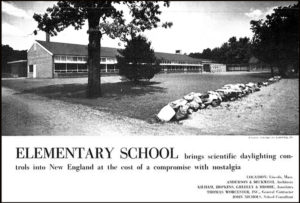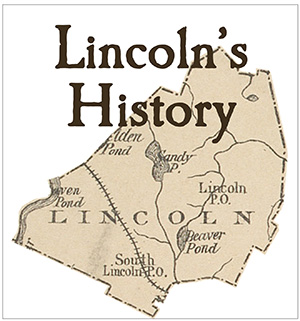By Don Hafner
The names of Lincoln’s schools are not what you probably think.
The Lincoln school buildings — Smith, Hartwell, and Brooks — are named after Lincoln’s Revolutionary War soldiers, right? William Smith, captain of the Lincoln Minute Men. Samuel Hartwell, sergeant in the Minute Men. Eleazer Brooks, colonel in the Massachusetts Provincial Army.
Well, no. Smith school is named after Charles Sumner Smith (1857–1927), a wealthy Lincoln businessman and investor who gifted $50,000 to the town for the construction of a new school. In his will, Charles Smith “suggested” that the new school be named after himself. The school was finally built in 1949 and was named after Smith during the town’s bicentennial anniversary in 1954.

In August 1950, Architectural Forum magazine spotlighted the Smith School and its advanced design. Click image to download a PDF of the full article (photocopy courtesy of Andrew Glass).
The Hartwell school is named after William Hartwell (1637–1690), who was mistakenly believed to be the first European settler in the part of Concord that became Lincoln in 1754. Hartwell owned land in Lincoln, but he dwelt in Concord and never built a home here. The Hartwell school was built in 1958.
The Brooks school is named after Joseph Brooks (1681–1759), a generous donor who gave the town £388 in 1761 to establish a “Grammar School Fund” for paying Lincoln’s teachers. Among those paid from this fund was young William Smith, soon after he moved to Lincoln and before he became captain of the Lincoln Minute Men. In 1759, the first women teachers paid by the town were also supported by the Fund. (Women were paid, we might note, at exactly one-half the salary paid to the male teachers.) Brooks’ £388 gift was equal to about $110,000 today. The Brooks school was built in 1964. The Lincoln Historical Society proposed that the new school be named after Joseph Brooks, and so it was.
For more on Lincoln’s schools through the centuries, there is no better source than John C. MacLean’s A Rich Harvest, available from the Lincoln Historical Society.
“Lincoln’s History” is a biweekly column about aspects of Lincoln’s past by members of the Lincoln Historical Society.

Such an interesting article. Thank you LHS and Don Hafner for your column about Lincoln’s History. It enriches my day. From this series I have learned something new, or newly remembered. Keep them coming, please.
Mary Ann Hales
What Mary Ann said. I heard Don mentioned in a Patriot’s Day program yesterday from the National Park rangers, who cited his research. Well done.